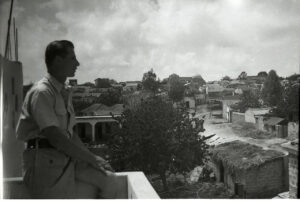From Salama to Kfar Shalem: How Mizrahim fit into the ongoing Nakba

An Israeli soldier looks out over the Palestinian village of Salama, 25 April 1948
Doron Yacov and Adi Golan Bikhnafo write in +972:
Any comprehensive discussion of the nature of the Zionist project in Palestine and the ongoing Nakba must address the ways in which, from the very beginning, power relations between Ashkenazim (Jews of European descent) and Mizrahim (Jews native to the Middle East) have affected and been affected by the dispossession of the Palestinian people. The roots of Israeli colonialism lie in the European origins of Zionist ideology, and it is these same origins that also produced structural discrimination against Mizrahi Jews within Israeli society.
As such, in order to take responsibility for the Nakba, redress the injustice, and build an equitable society, we must ask: what responsibility do Mizrahim bear for the Nakba? Have they played a uniquely significant role in uprooting the Palestinian people? And can they play a uniquely significant role in promoting justice and redress?
In the Tel Aviv-Jaffa area, the pattern of the Mizrahi role in the Nakba is easily identifiable. After the occupation and depopulation of Palestinian localities, the lands and homes were transferred to Israel’s Custodian of Absentee Property, established by a law in 1950, which used them to house Jews; many of them were Mizrahi immigrants, but also refugees from battle zones during the war. This populating of “abandoned” property formed part of a deliberate strategy to prevent the return of Palestinian refugees.
The property rights of these new Jewish inhabitants, however, were intentionally left unregulated. Today, many of the Jewish residents are considered “squatters,” and the state evicts them without appropriate compensation, usually to make room for high-end housing projects. Thus, under the legal guise of the Absentee Property Law, the agents of Palestinian dispossession and erasure become the secondary victims of the same ideological project.
